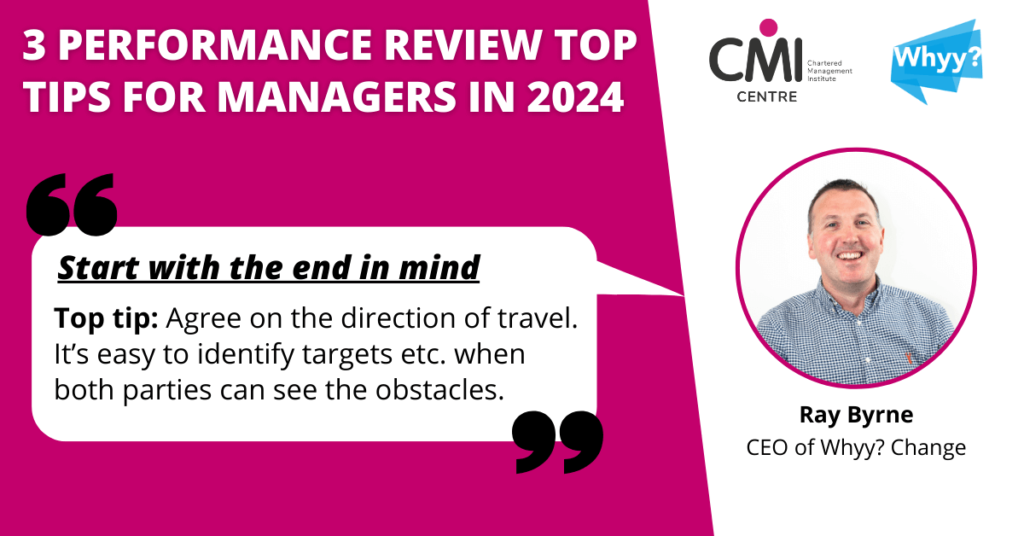In this article, Ray Byrne, CEO of Whyy? Change shares his three top tips for conducting an effective performance review.
Relax, rest your eyes, and tell me what comes to mind when I mention employee performance reviews. I suspect that for most, our inner chimp is probably screaming ‘NO’ based on that memory that felt very similar to an episode of ‘Squid Game’.
Surely this is bonkers and goes to show that good intentions can lead to hell. The hell of feeling that you are justifying your existence or the hell of completing the paperwork to suit a corporate timeline.
The good news is that we have a chance to replace that memory with the modern experience of what appraisals and reviews should be about. So here’s Ray Byrne, CEO of Whyy? Change’s thoughts and top tips:

1 – Start with the end in mind
The sole purpose of a review is to reflect on today to make tomorrow better. Make sure that the aim of the company is clearly known by all and that today we are going to discuss how we are going to reach these goals. It all sounds a little woolly, however focusing on the ‘WE’ it removes the defences we raise when preparing for hand-to-hand combat. Not in the gladiatorial form, but sometimes it does feel like that.
Make it easy to have an open conversation, and once you feel trusting, the candour of the topics raised will highlight areas to focus on. It’s either that or wait for the question that starts with “How do you feel you performed last year?”.
Top tip: Agree on the direction of travel. It’s easy to identify targets etc. when both parties can see the obstacles.
2 – Be more fluid in giving feedback
A review is usually the formal response to having a conversation with your team, but why should this only take place every year, every quarter or every month? Isn’t a review simply an opportunity to pass on the feedback that you want a response to?
I’ve been part of a system that works like that. It doesn’t work. It saps the energy of everyone involved. Can I suggest the alternative method of little and often, face-to-face on an informal coaching basis, and having a ‘light-touch’ FORMAL process that makes the manager accountable for the process structure, but the individual solely responsible for making sure the process happens?
Top tip: Flip the process on its head. Transferring the responsibility to the individual focuses power into the right hands to empower change. After all, if they are too busy to talk about their own future, then do they have the right behaviours?
3 – Trust and verify
If you write the plan, it’s another action list that may or may not be completed. If they write the plan, then it becomes part of their being. Your job is to make sure that any objectives set are SMART in nature but more than that, your job is to ensure that the individual must grow towards the objectives. Otherwise, why are you having the conversation?
Top tip: Give more focus on improving the inputs to the process, and not simply the outputs. Stretch them and it’s a ‘YES’ to all the support they need.
In a small business, you are juggling many plates. The question do you want the team worrying about dropping the plates or thinking of ways to automate the process? Life is easier with the team on your side!

Laura Wright, Head of People and CIPD tutor at Whyy? Change summarised her thoughts;
Performance management is critical to an organisation’s success but too often managers see it as an annual ‘tick box’ exercise. Effective performance management centres on regular two-way discussion and is key to maximising the potential and value that each employee brings to an organisation. According to the CIPD, the approach to performance reviews has changed over recent years with:
- Less focus on annual appraisals; greater focus on regular performance reviews.
- Less focus on process, such as forced ranking; greater focus on high-quality conversations, often aided by a coaching style and sometimes involving a strengths-based approach.
- Less focus on judging or appraising past performance to inform administrative decisions; greater focus on understanding current challenges and opportunities to help people improve.
Over to you, imagine what your next employee performance review could look like…
FAQs
How should a manager prepare for a performance review?
To prepare for a performance review, a manager should set clear expectations, gather feedback from various sources, and plan to provide actionable feedback. This ensures a comprehensive and objective review that benefits both the employee and the organisation.
What are the 3 R’s of performance management?
The 3 R’s of performance management are Results, Recognition, and Rewards. These elements help organisations ensure that employees are meeting expectations, feel valued for their contributions, and are motivated to continue performing at a high level.
How can managers provide constructive feedback during performance reviews?
Managers can provide constructive feedback during performance reviews by focusing on specific behaviours or actions, using clear and objective language, offering specific examples, and suggesting actionable solutions. This approach helps employees understand how they can improve and achieve better results.
What are some effective ways to motivate employees during a performance review?
Some effective ways to motivate employees during a performance review include setting clear goals, acknowledging their contributions, offering development opportunities, and providing recognition and rewards. These strategies help employees feel valued and motivated to continue performing at a high level.
How often should performance reviews be conducted?
Performance reviews are usually conducted annually, quarterly or sometimes monthly. However, little and often face-to-face informal coaching with a process in place can help to make the process less daunting for employees.
Why are performance reviews important?
Performance reviews are a vital component of the performance management process. They serve to inform administrative decisions like pay, promotions, or redundancy while supporting employee development. Additionally, they can help managers set targets and improve employee performance.
Need help with your people development plans? Get in touch with Whyy? Change. Visit www.whyychange.com, email info@whyychange.com or call them on 0114 400 0077 for a chat and a cuppa.


